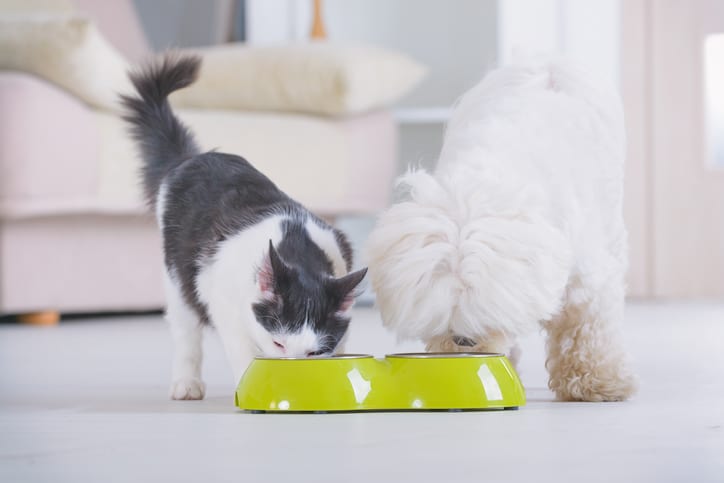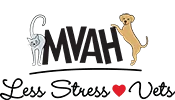Can Dogs Eat Cat Food in Amesbury, MA?
When it comes to your dog eating cat food, the question is not so much can they eat it, but rather should they. Cat food is high in protein, smells delicious and is almost certainly irresistible to your dog. Odds are if you have a cat and a dog in your home, you’ve had to figure out a way to keep your cat’s meals out of your dog’s reach. In short, the answer to this question is no. Dogs really should not eat cat food, with some few exceptions.
The Difference Between Cat Food and Dog Food
Below are a few differences between cat food and dog food.
Powerful Protein
The biggest difference between cat food and dog food is the amount of protein in cat food. Cats are strictly carnivorous, meaning their bodies are meant to eat meat, meat and only meat. Believe it or not, dogs are omnivores, so their bodies are equipped to digest meat and plants, and they actually need plants to keep healthy. Cat food, even kibble, has an incredibly high protein content which both makes it delicious to your dog, and may upset his stomach.
Amino Acids
Cats require eleven essential amino acids, whereas dogs only need ten amino acids. The additional amino acid, called taurine, is in high supply within cat food because cats lack an enzyme to convert other amino acids into it. Omnivores, like dogs, are able to synthesize taurine from other acids, so that excess taurine might lead to problems. Excessive amounts of taurine over a long period of time have been shown to play a role in four types of kidney disease.
Fats
Cat food also has a very high amount of fat in it. This is because cats are built to digest fats efficiently and turn it to energy. However, dogs that ingest too much fat tend have issues with their pancreas. In dogs, the pancreas plays two vital roles – it supplies hormones essential for blood sugar control, like insulin and glucagon, and it produces enzymes that are used to break down proteins, carbohydrates and – you guessed it – fats. A high level of fat in your dog’s blood is called lipemia, and it is the most common cause of pancreatitis in dogs.
Calorie Count
Calorie count is another difference between cat food and dog food. When it comes to calories in your pet’s diet, the critical point isn’t so much how many calories they’re getting, but where they’re getting those calories from.
The average house cat should get about twenty calories per pound each day, meaning a cat that weighs ten pounds should be ingesting two hundred calories daily to maintain a healthy weight. Of those calories, thirty-five to forty-five percent should come from meat protein sources, and thirty to forty percent should be from fat. The remaining ten to twenty percent of calories should come from carbohydrates.
Conversely, the average dog needs between twenty-five to thirty calories per pound daily to maintain a healthy weight. This means a dog weighing fifty pounds should be eating around 1,250 to 1,500 calories a day. However, for dogs, only about ten percent of those calories should come from protein and around five percent should be from fat. Feeding your dog cat food regularly means those calories aren’t coming from the correct places and can lead to your dog becoming overweight or other serious health complications.

Is it Okay for a Dog to Eat Cat Food?
A couple of mouthfuls of cat food from time to time will probably not be a problem for most dogs but dogs should not be eating cat food on a regular basis. It is important to talk with your veterinarian since some dogs should never eat cat food.
Some Dogs Should Never Eat Cat Food
Talk with your veterinarian before giving your dog cat food in any situation. Here are a few cases where your dog should never eat cat food.
Sensitive Stomachs
If your dog is prone to develop digestive distress, the richness of cat food might cause vomiting or give her diarrhea which can lead to dehydration.
Kidney or Liver Disease
Dogs suffering from kidney or liver disease or failures should never eat cat food because the high protein content will overtax those organs further.
Overweight or Obesity
An overweight dog is already at a higher risk of developing pancreatitis, so feeding him high fat meals, like cat food, will only increase that risk.
Do You Have Questions About Your Dog’s Diet?
If you have any questions regarding your dog’s diet, you should always call (978) 388-3074 or book an appointment online to talk with your veterinarian at Merrimac Valley Animal Hospital to discuss it.
Recent Posts
About Us
Merrimac Valley Animal Hospital had humble beginnings in 1968. Dr. Walter Brown opened the animal hospital in a garage next to his home near the current hospital and operated out of this small space until the current building was built in 1969.
